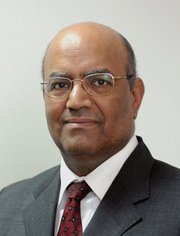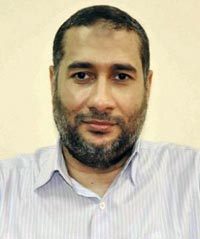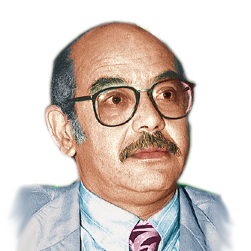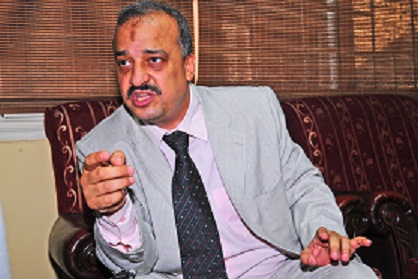One columnist analyses the Tamarod campaign and sees what the Muslim Brotherhood can learn from it, another addresses the recurring blackouts and who to blame, while the third explains why the Shura council is a scandal in itself.
Dr Taha Abdel Alim
Lessons from Tamarod campaign
Al-Ahram Newspaper
Dr Taha Abdel Alim extracts some beneficial lessons from the Tamarod campaign. The first lesson, “from which the Muslim Brotherhood can learn”, is that the revolutionary youth will not stand down.
Then he continues to explain the purpose of Tamarod, which has garnered wide support and attention from the Egyptian people, as well as from different political entities. “The campaign issued an important statement, saying: ‘The Tamarod campaign belongs to the Egyptian people with their different political movements. It also belongs to the simple Egyptian citizen in the village, alley, street and neighbourhood. It is a campaign that unites rather than divides, and aims at reaching every single Egyptian, so that we can become one front against Morsi’s oppressive regime and the office of his his Supreme Guide’s. Any entity that seeks to divide [the country] in this historic moment, even if inadvertently, serves the tyrannical Muslim Brotherhood.’”
The second lesson is that “the campaign is a reaction to the Brotherhood’s failure to understand the meaning of a revolution”. The columnist then mentions that the ruling party failed to address the opposition’s concern regarding the transparency of the elections. They also failed in providing stability for the people and the country, including protecting citizens and respecting their rights. So, the campaign is a “refusal of what the Brotherhood bears as a threat to the Egyptian lifestyle”.
The third lesson is that the campaign is “a practice of freedom of speech”. Abdel Alim mentions that the campaign has been using “peaceful methods” to collect signatures to withdraw confidence from the president and hold early presidential elections. The Brotherhood fails to acknowledge the campaign and instead dubs it as a “minority”.
The fourth lesson is that the peaceful approach of the 25 January Revolution was the main reason it succeeded and the goals the resulted from the uprising remain a condition for a number of Egyptians, hoping to rebuild the system. He mentions that the oppressive and violent ways of the former regime failed to quell the revolution, and the same will happen with the current regime. Tamarod, the columnist claims, is also a refusal of all the violent and chaotic movements such as the Black Block group and others.
The fifth lesson is that the campaign refused to be described as a feloul (remnants of the former regime) conspiracy. Even though Shafiq signed one of its forms, it refused his signature because, to the campaign members, he is a symbol of the former regime.
In the end, Abdel Alim sees Tamarod as a step towards building a country that is based on citizenship and freedom.
Adel Al-Ansary
Ministry of electricity and managing crises
Freedom and Justice Portal
Adel Al-Ansary addresses the past legacy of the Ministry of Electricity, and the difficulty of amending the negative reputation that has resulted. However, he does not agree to completely dismiss the ministry’s responsibility because it would take months to amend the mistakes of past ministerial leaders and policies.
He says that it is important to demand that the recurring blackouts be addressed and reduced, especially in rural villages and governorates, which the columnist says have always been neglected by officials. He adds that the Electricity Ministry should have a section for dealing with crises, especially the ones expected and that are repetitive, and they should put a contingency plan to face such crises.
“Even if the solution is outside the jurisdiction of the ministry, it falls upon it the responsibility of demanding the needed supplies.” The ministry, he says, should urgently and efficiently communicate its needs to the cabinet.
Al-Ansary states that if the cabinet ministers’ fail to properly address the problem, then the issue must be taken to the presidency. “What engineer Radwan Abdallah, who is responsible for the energy file at the presidency, said is not enough, and does not lift the huge responsibility of continuous blackouts during the scorching summer, especially in Upper Egypt and during the exam season, off of anyone.”
He adds that government officials said that the problem lies in closing down four natural gas wells due to technical difficulties. In addition, the reserves of Mazut reaching 1.5 million tonnes have been consumed, and the amount has only been enough for a day and a half.
He asks why there were no repairs done before the summer, and why the crisis has not been communicated properly to the cabinet and presidency, which he says “both could have solved the problems through international and regional connections to supply the needed natural gas”.
Al-Ansary concludes with a call to all those concerned to create a plan for solving the current crisis.
Galal Aref
When legislation transforms into conspiracies and scandals
Al-Tahrir Newspaper
“It is a council that was elected to be merely a decoration in the political life, or a present to please some supporters, and then suddenly it becomes a legislative council, issuing laws during one of the most dangerous periods in the country’s [history],” Galal Aref states in reference to the Shura Council. In his column, he considers the upper house of parliament a “complete and utter scandal”, calling it the “seven percent council”.
The columnist states that the Shura Council is based on a botched law, and that it should have been treated as the previous parliament, which was considered illegal. It only remained due to President Mohamed Morsi’s oppressive constitutional declaration. He mentions that the way the council conducts its business reminds him of the days of Ismail Sidky who was the Egyptian prime minister during the 1940s that accumulated absolute political powers. The author makes this comparison by saying the legislative power of the council was supposed to be temporary till the election of a parliament.
The Shura Council was responsible for creating the election laws, and it did, but when the law was sent to the Supreme Constitutional Court, it was discovered that over half its articles needed amending. Instead of making the necessary amendments, the council announced that it will create a new law, and when this was sent to the court, at least six articles were deemed unacceptable.
Aref wonders why the council had problems coming up with an appropriate law, and he does not rule out council members’ ignorance of the law and constitution. He also asks whether it is also about the desire to pass laws that would guarantee the Brotherhood’s interests or is it to waste time so that the feared elections would never come.
He also asks whether the council is capable of discussing laws and judicial matters, and whether its members should be entrusted with the fate of Egypt’s judiciary. “A look at the proposed judiciary amendments tells us we are facing an attempt to take revenge on Egypt’s judiciary and an attempt to make it submit to the executive authority.” Aref adds that there is a plan to get rid of one fourth of Egypt’s judges, so that supporters of the current regime would take their place.
He adds that all of the country supports the judges’ struggle against the law, but that the concern should be with stripping the Shura Council of its legislative power, except in cases of emergency. He explains that the council is not equipped to issue laws concerning Egypt’s judiciary, and it is also not equipped to issue a law concerning the development of the Suez Canal, “which they turned into a province removed from Egypt’s jurisdiction to conduct an auction for its sale and rental”.
He also mentions that the council had no power to pass the law concerning Islamic bonds, which Al-Azhar refused. The council’s answer was to remove “Islamic” from the title and turn it into to a way to sell Egypt’s lands and facilities.
To Aref, the Shura Council is responsible for issuing laws concerning the parliament, elections and the political life, and nothing else.






